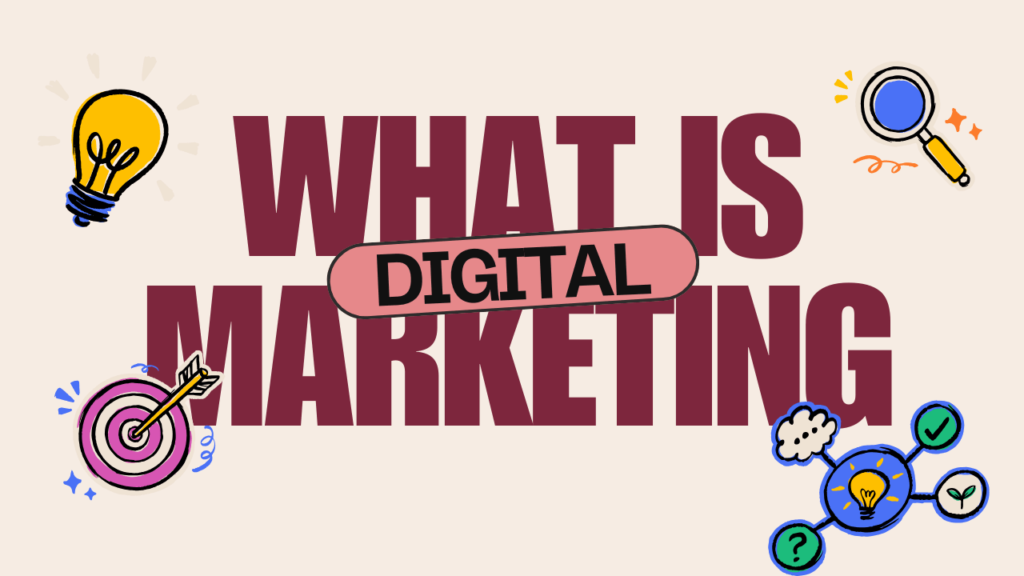What is Digital Marketing?
What is Digital Marketing? In today’s fast-moving, screen-dominated world, the way businesses reach their customers has completely changed. Traditional marketing—like TV ads, radio jingles, and newspaper flyers—is no longer enough. Why? Because people now spend more time scrolling on phones, Googling questions, and watching YouTube than flipping through magazines. This is where digital marketing comes in. What Is Marketing? Marketing is the process of promoting, selling, and delivering products or services to customers. It includes everything from understanding customer needs to building brand awareness and generating sales. In simple words: Marketing is how businesses communicate with people to create interest and trust in what they offer. But today, the way people consume information has changed. Most of us are scrolling Instagram, watching YouTube, or searching on Google before making decisions. That’s where digital marketing comes into play. Types of Marketing There are two types of marketing – Traditional and Digital Features Traditional Marketing Digital Marketing 1. Platform Offline (TV, radio, newspapers) Online (Google, social media, websites) 2. Cost High (printing, broadcasting costs) More budget-friendly and scalable 3. Targeting General audience Specific audience based on age, interest, etc. 4. Measurability Difficult to measure Real-time tracking and performance data 5. Interaction One-way (business to consumer) Two-way (likes, comments, shares, feedback) 6. Reach Limited to certain areas Global reach 7. Examples TV ads, posters, flyers, billboards SEO, social media ads, email campaigns, blogs What is Digital Marketing? Digital marketing is a modern form of marketing where businesses use the internet and digital channels to connect with current and potential customers. These channels include: Why is Digital Marketing Important Today? In short, digital marketing meets your customer where they are: online. 7 P’s of Digital Marketing These apply to both traditional and digital marketing, but in digital, tools and platforms change. Benefits of Digital Marketing Types Of Digital Marketing 1. Search Engine Marketing: This entails companies attempting to increase search traffic in two ways. First, companies can pay search engines for placement on result pages. Second, companies can emphasize search engine optimization (SEO) techniques to naturally rank high in search results. 2. E-mail Marketing: This entails companies obtaining customer or potential customer e-mail addresses and distributing messages or newsletters. These messages can include coupons, discount opportunities, or advance notice of upcoming sales. 3. Social Media Marketing: This entails building an online presence on specific social media platforms. Like search engine marketing, companies can place paid advertisements to bypass algorithms and obtain a higher chance of being seen by viewers. 4. Affiliate Marketing: This process involves using third-party advertising to generate customer interest. Typically, an affiliate, who earns a commission from each sale, engages in affiliate marketing. Since the potential commission incentivizes the third party, they are motivated to drive sales for a product that is not originally their own. As a result, this creates a mutually beneficial relationship between the product owner and the affiliate. 5. Content Marketing: This entails creating content, whether eBooks, infographics, video seminars, or other downloadable content. The goal is to create a product (often free) to share information about a product, obtain customer information, and encourage customers to continue with the company beyond the content. How Does Digital Marketing Work? 1. Awareness: Use SEO, social media posts, blogs, and ads to make people aware of your brand or product. 2. Consideration: Share helpful content, customer reviews, and comparisons to show value and build trust. 3. Conversion: Use landing pages, offers, email sign-ups, and clear CTAs to turn interest into action. 4. Loyalty: Send thank-you emails, share exclusive content, or provide loyalty rewards to retain customers. 5. Advocacy: Encourage satisfied customers to leave reviews, refer others, or become brand ambassadors. This is called the digital marketing funnel. Careers & Scope in Digital Marketing Digital marketing is not just a skill—it’s a career field with growing demand. You can become: You can work: Tools You Can Use (Free & Beginner-Friendly) Purpose Tools Graphic Design Canva Email Marketing Mailchimp, Sender Social Media Scheduling Buffer, Meta Business Suite, Publer Website Building WordPress, Wix, Shopify Analytics & SEO Google Analytics, Ubersuggest, SEMrush Which marketing is best for my small business Social media, email marketing, blogging — there are plenty of ways for businesses to promote themselves online. It’s important to focus on the best type of marketing to reach your target user. Do some market research and get clear on your audience. 1. Social Media Marketing 2. Search Engine Optimization (SEO) 3. Email Marketing 4. Performance Marketing (Paid Ads) 5. Content Marketing What are some marketing ideas for small businesses You can host virtual or in-person events or social media contests in which you ask users to tag others, follow your business account, and share it for extra entries. These are just a couple of ways to expand your reach and connect with your community. FAQS (Frequently asked questions ) About the author Chelsi Sharma is a passionate and aspiring digital marketer currently honing her skills through Skill Circle. She specializes in SEO, social media marketing, email marketing, performance marketing, and website optimization. Chelsi is dedicated to helping individuals and small businesses build a strong online presence through effective and easy-to-implement strategies. As a beginner herself, she understands the challenges newcomers face and aims to simplify complex digital marketing concepts through her blog. With a growing interest in the ever-evolving digital landscape, Chelsi is committed to learning, experimenting, and sharing valuable insights that empower others to succeed in their digital marketing journey.

